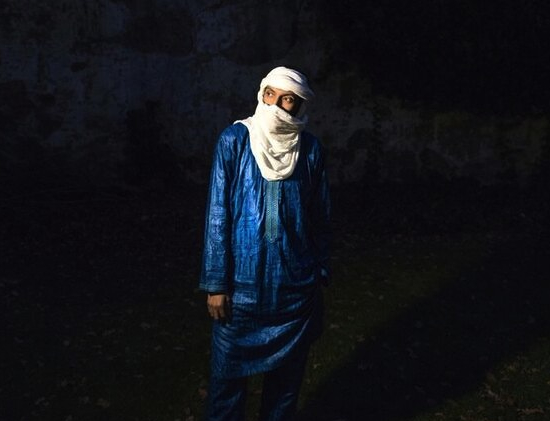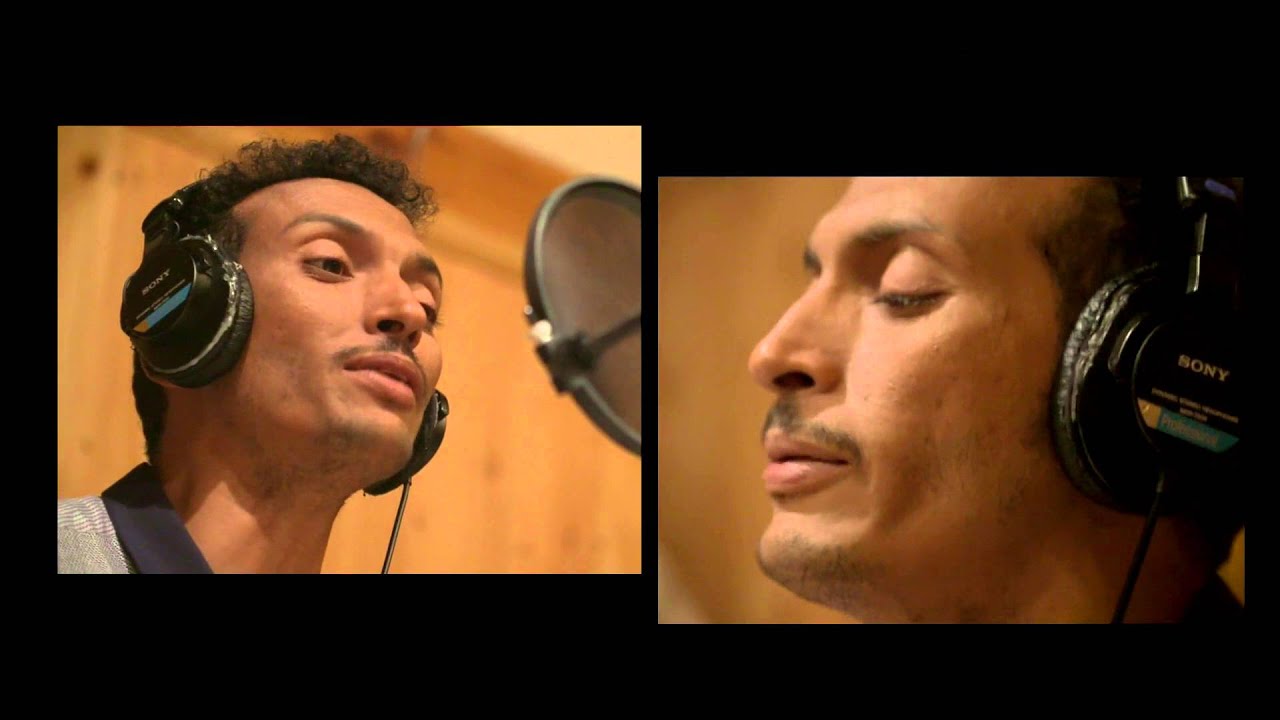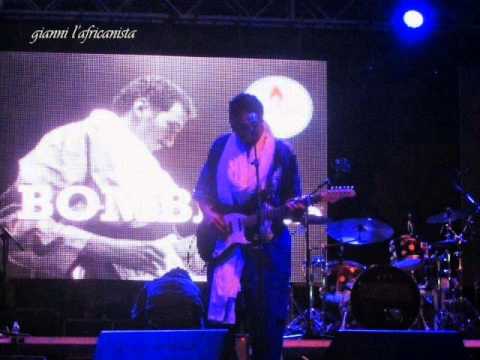Omara "Bombino" Moctar seems to have breezed through a series of life-threatening situations to become one of the most original guitarists in the world, and certainly he’s become one of the cynosures of music outside of Europe and the Americas during the last five years or so. His newest album, Azel – recorded with Dave Longstreth of the Dirty Projectors in Upstate New York – is only likely to add further acclaim to this already dazzling career.
As a Tuareg musician (the Tuareg are a nomadic Berber people, mostly situated in North West Africa), Bombino experiences daily the hostility of the desert when he’s at home, and he and his family adapt to it and master it, where most of us would quickly perish. Indeed, when I meet him in Paris he complains about how cold it is, and one senses after four days of solid press he’s ready to return to his family in the hot and dry dust bowl he calls home.
“I am inspired by the desert, particularly the sunsets,” says Bombino in the 2010 documentary, Agadez: The Music and the Rebellion, a film about his music and his hometown. The documentary is also about the tribulations his people faced during the Tuareg Rebellion of 1990-95, which saw him and his family go into exile in Algeria, Burkina Faso and Mali during the uprising against the brutal and corrupt Mamadou Tanja government.
His music and lyrics frequently address Tuareg geopolitical concerns in the Tamasheq tongue (“it’s my mother tongue and it’s the language I get the best inspiration from,” he tells me.) Album opener ‘Akhar Zaman (This Moment)’ for instance, is about “identity, and the loss and fear of losing your culture. Hip hop is taking over; the way kids dress is American-influenced, it’s not the desert style. Globalisation is changing things. Tradition is important, especially for the environment we’re living in. If I’m in Europe I’ll wear my jeans, but when you go home it’s good to be seen in traditional wear, and you know how to wear your turban. It’s important for the history of our people.” Despite the fact he says he wears his jeans in Europe, Bombino arrives in full turban and traditional Tuareg dress, and curses himself for only bringing his sandals, such is the perishing weather.
So how are you, Bombino, despite the inclement weather?
Bombino: Not bad. I’m well rested after a long year of playing. Things are fine.
Have you seen much of Paris since you’ve been here?
B: I didn’t have the time to go out very often. Everything has been done in this hotel. This afternoon we actually left, went to a French restaurant, which was nice. Delicious pasta! It’s just too cold for me outside. I’ve spent two months at home so I forgot how cold the European winters are. It’s strange the changes here, the sun, the rain, the snow…
Your producer Dave Longstreth said you don’t talk a lot. Do you prefer to communicate through the guitar?
B: Yes, I suppose so. We talked a lot when we came together. We exchanged methods, how to develop ideas in terms of vocals and keyboards that we were adding, and harmonies that he suggested that I integrate. It’s a bit different [from what I’m use to]. He has a real desire to exchange ideas. While the protagonists of this project were there, Dave, myself and others, it was important to open out to my music – Tuareg music – and that’s how we developed Tuareggae, our own form of reggae. It’s something I’ve been exploring for a few years.
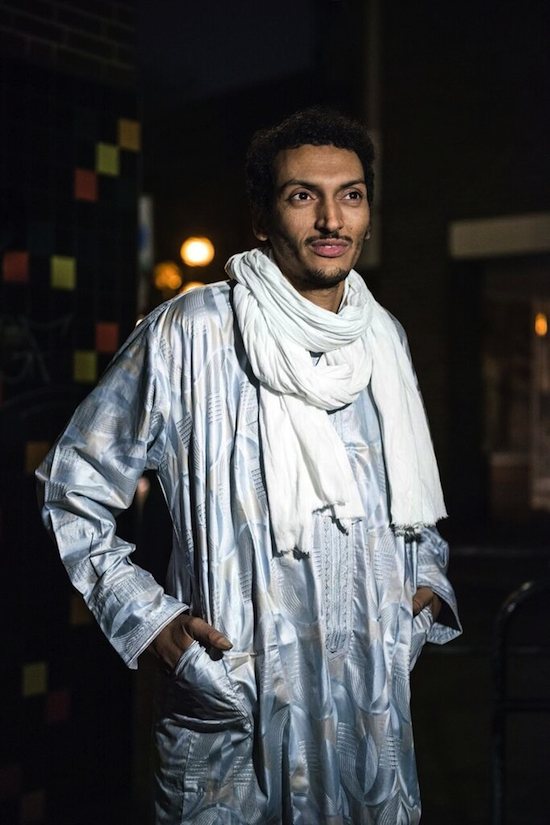
So would you say you are the spearhead of a new type of music?
B: Yeah, in the rhythms, I found things in Tuareg music that link very well with reggae. Our drummer [Corey Wilhelm] is from Boston, and he really mixed reggae with traditional Tuareg music, so there was this connection.
So you’ve originated a new genre then?
B: Yes, with the complicity of others. Like the bass player, Djak Dia, a Mauritanian/ Belgian bass player. He’s a nomadic Mauritanian but he settled in Belgium.
I guess that sound is best explored on the track ‘Iyat Ninhay/ Jaguar (A Great Desert I Saw)’?
B: It’s a collaboration of artists, the bassist, the drummer… Originally ‘Jaguar’ is a song that women sing to and dance; it’s a lovely number, a traditional song, and it’s very powerful when women sing it. I talk about the desert and we add the Tuareggae and then ‘Jaguar’ comes in. It’s a very long song, and it’s my favourite one on the album.
It sounds more a natural fit with Dave Longstreth than perhaps the last album – Nomad – that you recorded with Dan Auerbach of the Black Keys.
B: Yes, I agree. With Dan maybe it was too quick. With this one we took our time. We spent three weeks, almost a month in all on it. Nomad was done in just ten days. It’s been four years that we’ve been rehearsing and working on half of the songs on this album, so there’s been a long gestation in between recording. We played Nomad out and about at festivals and shows, but we slipped in a few of these extra songs to see how people would react, and how people would enjoy these Tuareggae rhythms. We road tested the songs and they worked well. Dave didn’t change anything, he just modernised a few things. It’s very subtle – for example the keyboards – they’re very subtle and you can hardly hear them, but they are there. It’s important that there’s an exchange between artists. The musicians and the producer accompanied me well, and they touched me deeply.
What was it like recording in America again?
B: We recorded in Upper State New York, near Woodstock. It was outside the city, and there was no noise. It’s one of the best places to play; you sleep there, and then you eat together and you work. That’s what music is all about. It reminds you of when you were just experimenting and learning the guitar, try this chord change here… you bring one version, and if you’re not happy with it, you change it. It’s like a family, and it’s like passing a diploma in the studio at the same time.
From what age were you playing the guitar?
B: It’s been a long time, a very long time. In 1990 or 1991 I saw the guitar and I was 10 or 11 then. Without really knowing that that was the guitar. It was the first connection.
What drew you to it?
B: It was my cousin that came in with it, when we left Agadez for exile in Tamanrasset in Algeria. I first came in contact with an acoustic guitar, and it was the sound that attracted me. Instead of going to school I used to take the guitar off somewhere and play it.
Time well spent then…
B: Yes indeed. It’s a long story how I came to play the guitar. I was only very young at that time, and the guitar was considered to be for adults. It was only at night when the guitars came out, so I’d sneak out, my parents didn’t know anything. There was nothing else around, no shops, and nowhere to buy guitars, or strings or anything else for that matter. Even nowadays that’s the case. It wasn’t until my uncle gave me my first guitar that I got going. I had an uncle who first gave me an accordion, but I didn’t get on with it, so I persuaded him to give me a guitar in its place. And my uncle, who lived in Niamey – the capital of Niger – he’s a painter and artist, and he was quite successful in Europe. He had many exhibitions there. So when he sold paintings he would buy musical instruments, piano, accordion, guitar, and he brought them back to Niamey. I’d heard of him, my uncle, and that was my only solution. So I went to Niamey to find him, I was 15 years old – it was 1995, and I wasn’t scared, I’d already done that trip when I was in exile…
It was dangerous to travel at that time?
B: During the rebellion it was quite dangerous, but it was easier after the truce was signed in 95. In 91, 92 we went into exile. There was a war around Agadez, there was conflict, and a few years later there was peace, thankfully. A lot of people returned then. I enjoyed the experience of my cousins coming and playing the guitar in 90 or 91. So for me, my life was dominated by the desire to find a guitar when I came back. People began to live in peace, and Niger started to enjoy its first democratic elections.
And then you started playing the electric guitar?
B: Electric guitars at that time became a political symbol, and all the political parties like the UPDS Amana needed young activists to join them, so they would bribe them with guitars and microphones. It was so artists would come and play, which would bring neighbourhoods together with rallies, and then politicians would come and speak during these concerts. We would come and play these electric guitars because they were rare objects. We musicians didn’t care about the political parties at all, but we saw opportunities to play these instruments.
Do you always use a capo when you play?
B: It was when I created this character Bombino, I came to use the capo after seeing groups use them for women to sing, because they sing higher, and capos are for transposing. So we have low voices and women have higher voices, and the capo would be used up the frets to push the voice of the women higher or find their right pitch. It was a way to diminish the fretboard, and I liked the effect and adopted it in my own music.
How did you discover Jimi Hendrix?
B: I was with my cousins in Tamanrasset, and we went up to Libya (I have uncles in Al-Sampa near Tripoli). And that’s where the Tuareg live especially. They had lots of cassettes, and when they welcomed us they were playing Jimi Hendrix.
Did it blow your mind?
B: Oh yeah. I never saw what Hendrix looked like at that time. And then they played Dire Straits.
So was that when you discovered Mark Knopfler as well?
B: I didn’t know that name then, just the music. I went to Tripoli in 96, and that’s when I discovered Knopfler. It was a time when I had to work for three months in Tripoli as a shepherd to earn some money.
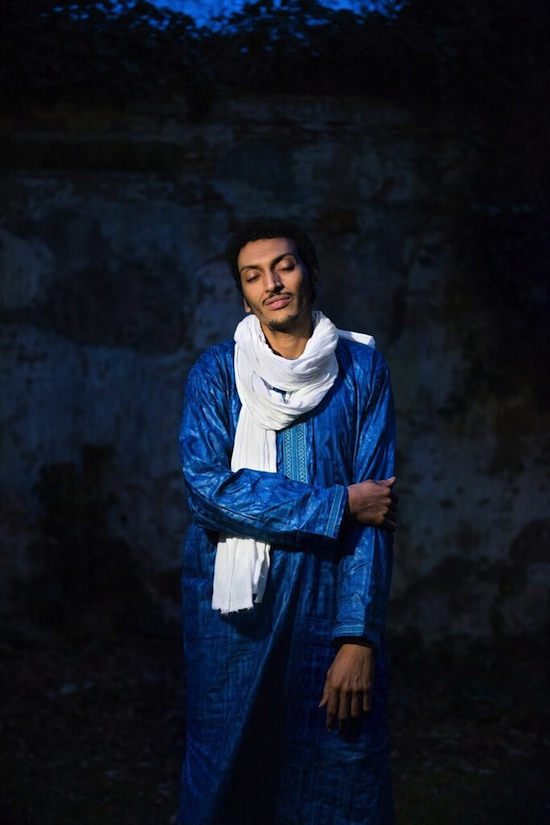
Are you quite nomadic yourself then? It sounds like you’ve been around a bit.
B: Yes, because I grew up with this. The whole family always travelled, there’s nothing unusual about it. When I was 17 or 18 I’d already travelled a lot, and then I had this idea to travel all around Niger with my guitar. That extended to the borders of Algeria, Mali, Burkina Faso… To go around Niger you need 23 days; it takes that long because the roads are very bad. It takes a couple of days to go 200kms sometimes.
And now because of your profession, you’ve got to travel much further afield.
B: Yes, thanks to my music, thanks to God and thanks to my friends and the fans who want to see me play. It’s my desire to share, and it’s all I really want to do. It’s especially this union with fans that I want.
And you’re spreading the love of Mark Knopfler. Because he’s not really the hippest name to drop these days. Perhaps you’re single-handedly bringing him back?
B: He was the frontman for Dire Straits and I got to see him in New Zealand last year. He’s not the coolest, you’re right. When I saw the concert videos in the 90’s, loads of other artists came and played with him and did fantastic solos; I copied the notes watching him and other artists he brought on stage with him.
On the first track ‘Akhar Zaman (This Moment)’, I can hear a bit of Knopfler. There’s almost a touch of ‘Local Hero/Wild Theme’ about it.
B: Yeah, sure, there is a chord that resembles one of his. I was a real fan, I have all the cassette copies of Dire Straits, Jimi Hendrix, Ali Farka Touré and others; they are sources of inspiration for me. It’s a real wealth of music, not just for me, but for my extended musical family.
What’s the song ‘Iwaranagh (We Must)’ about?
B: Things have really advanced positively for us Tuaregs since we were in exile in other countries. Tuaregs have shown a good example, as a positive story, they put down their arms, they got involved in politics, we have a Prime Minister who is Tuareg for the first time. It’s the longest time there’s been peace. We’re a good example for the other Tuaregs.
What about ‘Tamiditine Tarhanam (My Love, I Tell You)’?
B: It’s a story of love and youth, about a young musician who has just started his career, and he has competition for his girlfriend. It’s difficult because all he has is his guitar. Sometimes women will be looking for richer men because of all the poverty. It’s the guitar against money, and there’s corruption involved. It’s a very poor country I come from.
And finally, what about ‘Ashuhada (Martyrs Of The First Rebellion)’?
B: It’s about people who are lost in the desert from the rebellion. We call them the perdus, the lost. We talk about the causes that brought them there. It’s about the situation today and the situation when we lost so many people. We prefer our lives now compared to when we lost so many. Kids go to school, people are starting little businesses, it’s an ordinary daily life that we crave and that’s explained in the song. Even if my fans don’t understand my words, they should find a translator, because it’s the only way I can find the right words to really touch the heart.
Special thanks to Daniel Brown for his fine interpreting skills
Azel is out now on Partisan Records. Bombino plays Camden Forge on June 8 & 9

